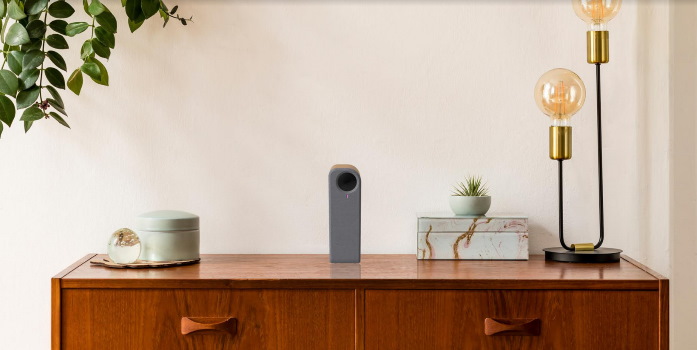
In a world-first, an Australian company has created a patented artificial intelligence (AI) device that is able to detect if a loved one or patient suffers a fall in the home, hospital or aged care facility.
Similar in size to a small portable speaker, the HomeGuardian.ai device uses sensors to monitor the interaction of objects and people within its surroundings and alerts carers or family members if a fall occurs.
HomeGuardian.ai co-founder and CEO Kane Sajdak said the device’s ability to track objects without saving or sending images or video will revolutionise the aged care, disability, hospital and childcare sectors.
“Make no mistake – this device will save lives,” said Mr Sajdak, who doubles as the director of award-winning IT service provider and IT consultancy firm BITS Technology Group.
“No one wants a security camera in their bedroom or bathroom, so our world-first technology is able to monitor someone’s interactions with their surroundings without breaching their privacy. More importantly, the device can detect a fall and alert a nominated contact within 1.8 seconds of the incident occurring.
“No wearables. No duress buttons. No smartwatches or Apps. Just peace of mind that if your loved one is in trouble; their emergency contact will know about it within seconds.”
With no need for WIFI, internet connections or individual programming, the easy-to-use units only need to be plugged into power and placed in a good vantage point to monitor a room.
The HomeGuardian.ai development team has spent more than a year “teaching” the AI device to recognise objects such as furniture and people, along with the ability to identify abnormal behaviours.
“The device knows it is normal for an object it recognises as a person to lay on a bed, but it also knows it’s not normal for that same object to lay on the bedroom floor or bathroom tiles,” Mr Sajdak said.
“It takes less than two seconds for the device to recognise someone may be at risk and immediately sends a notification to their emergency contact, be it a neighbour, loved one or nurse in an aged care facility or hospital.
“The alert can also be escalated to other people if the primary contact fails to respond within a designated period. Everything we have developed focuses on getting help to the user as soon as possible.
“Falls cost Australian governments more than $3 billion in hospital admissions each year and it’s directly related to how long people are on the floor. The sooner you get to them, the better their chance of avoiding major issues or complications. On top of this, many elderly people go from living independently in their own home into an aged care facility as a direct result of a traumatic incident such as a fall.”
Mr Sajdak said the company had worked with aged care groups as well as Southern Cross University to ensure the technology was enabling better care for those using it, while enabling staffing efficiency gains for the care providers implementing it.
“As well as text message notifications, the likes of aged care homes, hospitals and childcare centres can have the devices linked to a fully-fledged alerting dashboard, allowing staff to respond where they are needed when they are needed. It’s akin to having a staff member monitoring each room 24/7.
“This device is the perfect union of cutting-edge technology and practical application. It will allow people to live independently for longer, provide care providers with the best incident detection technology in the world and, crucially, save lives.”
HomeGuardian.ai devices retail for $399 each, with a $1.50 per day monitoring fee. Multipacks and care provider solutions are also available.
For more information, visit www.homeguardian.ai
| < Prev | Next > |
|---|





